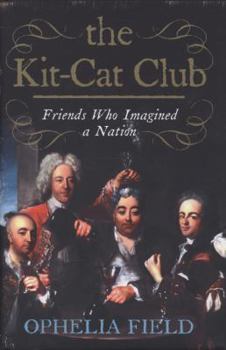The Kit-Cat Club: Friends Who Imagined a Nation
Select Format
Select Condition 
Book Overview
Ophelia Field's 'Kit-Cat Club' is a story of a changing time in 17th-century Britain, during the reigns of Queen Anne and George I, when a group of men and their enterprising initiatives paved the way... This description may be from another edition of this product.
Format:Hardcover
Language:English
ISBN:0007178921
ISBN13:9780007178926
Release Date:January 2008
Publisher:Harper Press
Length:524 Pages
Weight:1.89 lbs.
Customer Reviews
1 rating
The Whigs Change the World
Published by Thriftbooks.com User , 15 years ago
You would not want to be known as a member of a club in the sixteenth century; clubs then were seen as violent and conspiratorial gangs of men. By the eighteenth century, that had changed, and men could gather in clubs with a feeling of doing something constructive and high-minded. One of the main reasons for the change in meaning was the Kit-Cat Club, a massing of writers, musicians, artists, politicians, and titled gentlemen who met in London and flourished around 1690 to 1710. The influence of these men in politics, in art, and in forming the British character was vast. The influence of the club is detailed in _The Kit-Cat Club: Friends Who Imagined a Nation_ (Harper Press) by historian Ophelia Field. A big book, rich in detail pulled from diaries, notes, poems, plays, and letters to the press, this is an accessible history because although it deals in times and situations foreign to us, it concentrates on the personalities of the men, their interactions, their causes, and their successes. Readers may know Kit-Cat as only a candy bar (and in this unstuffy history, Field includes the confection in a late chapter "Later Clubs and Kit-Cats"), but they will be surprised at how much the Kit-Cat members influenced even our own time. The name of the club comes from Christopher "Kit" Cat's pies sold in Gray' Inn Lane in London, the simple fare for the meetings. We know what Johnson and his pals said at these meetings because of scribblers like Boswell. The Kit-Cats, however, left almost no record of what was said during their meetings, and so Field has used voluminous sources to fill in the picture. The club was brought together by Jacob Tonson, a publisher who, unlike many of his fellows, had a mind to posterity and to literature. Tonson agreed to give dinners to a group of young writers if they would agree to let him have the option of first refusal of their works. Not only was Tonson there, but aristocrats came for the purpose of rubbing shoulders with the artists and perhaps becoming their patrons. Around the table would have been Joseph Addison and Richard Steele, always linked together because of their joint production of the classic essays in their magazine _The Spectator_. The magazine is recognized as second only to the Bible in forming British character, and Field says that during its publication, and numerous reprints, it was "usurping the pulpit in defining Britain's moral order". Englishmen were defined by _The Spectator_ in contrast to the foppish and pretentious French, as eccentric, humble, blunt, confidant, and decent, and that image stuck. The Kit-Cats they also favored Whig positions of a constitutional monarchy, a strengthening of Parliament, a Protestant succession of the monarchy, and support for new commercial endeavors like the New East India Company. Their political reforms, although substantial, were only a small part of how they sought to mold the nation into a Kit-Cat ideal. The playwright John Vanbrugh co




